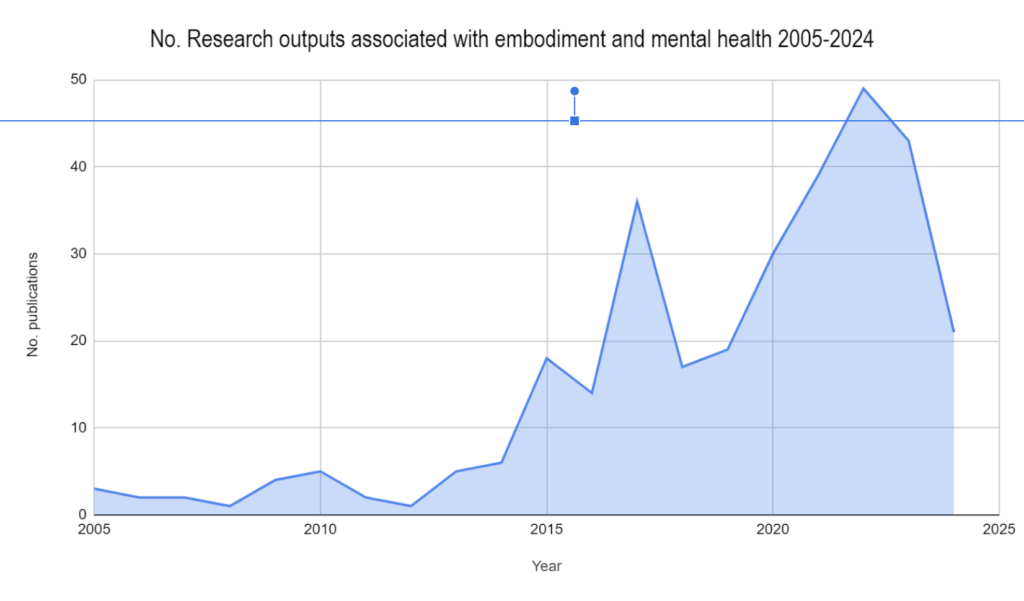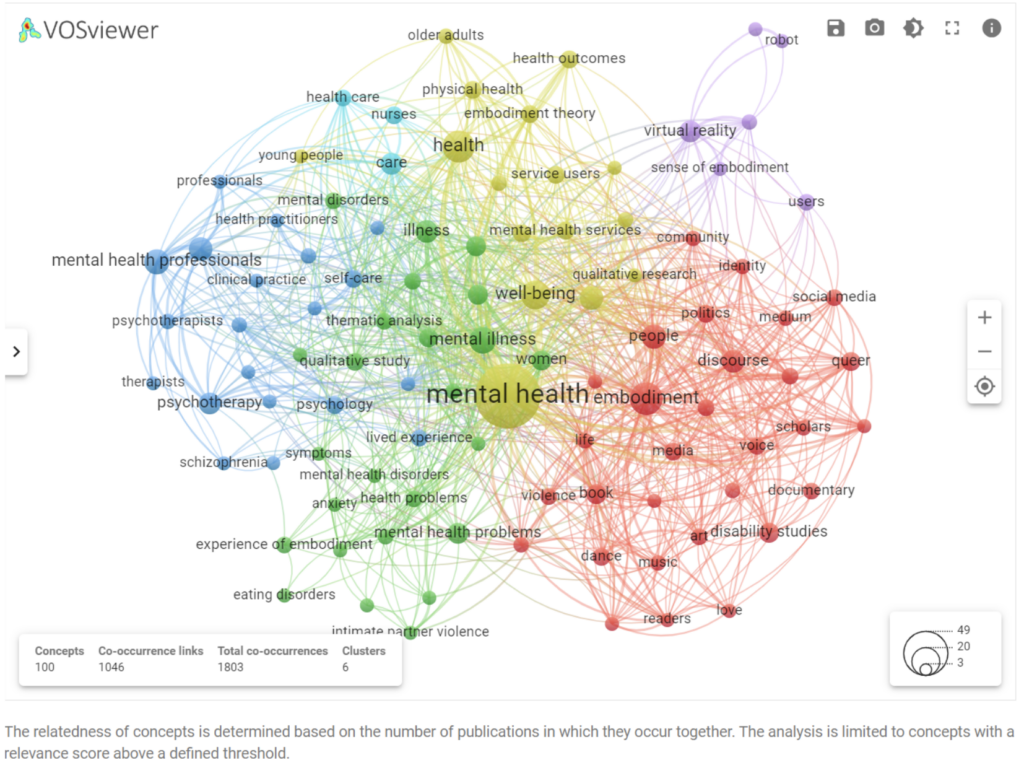Editor’s Note: Today’s post is by Danielle Feger and Briony Fane. Danielle is the Global Health and Wellbeing Manager at Digital Science and also works as independent stress counsellor and wellbeing trainer. Briony is Director, Research evaluation and global challenges at Digital Science. This “Mondays” post is running on a Tuesday due to the holiday schedule.
“Mr Duffy lived a short distance from his body.”
James Joyce, Dubliners
Living a short distance from our body means being aware that we have a body, but having very little awareness of what is actually going on there. It is a state of disconnection or dissociation from one’s physical self or reality. It can suggest a feeling of being detached or removed from one’s physical sensations, emotions, or experiences.
In this Scholarly Kitchen post focusing on mental health, we look at the construct of embodiment and practices within it that create a symbiotic relationship between embodied experiences and psychological flourishing. Embodiment holds the key to unlocking a deeper understanding of our mental well-being and offers pathways to cultivate self-awareness, emotional regulation, and resilience.
What is mental health?
According to the World Health Organization, “Mental health is a state of mental well-being that enables people to cope with the stresses of life, realise their abilities, learn well and work well, and contribute to their community.” Mental health conditions include mental disorders and psychosocial disabilities as well as other mental states associated with significant distress, impairment in functioning, or risk of self-harm. Mental health is more than the absence of mental disorders. It exists on a complex continuum, which is experienced differently from one person to the next.
What is embodiment?
Embodiment has its roots in philosophy and critical theory and its many definitions center on experiencing and perceiving the world from the location of the body. In recent years there has been growing interdisciplinary interest in embodiment across a number of established discipline areas, including philosophy, neuroscience, sociology, and psychology.
Embodiment philosophy and theory are based on the idea that the mind is integrated into the body’s sensorimotor systems, and cognitive processes are guided by body-based systems. The basic claim of embodiment theory is that all psychological processes are influenced by the body, including sensory systems, motor systems, and emotions.
Experiencing and understanding the world through one’s physical body involves recognizing the interconnectedness of mind and body, and how bodily sensations, movements, and experiences shape cognition, emotions, and behavior. This emphasizes the integration of physical sensations, emotions, and thoughts to promote a deeper understanding of oneself and one’s surroundings.
The experience of embodiment represents the combined understanding of having a body and being a body that is basic to the development of self-identity and mental health. It is a complex process involving the perception that one’s sense of self is localized within the body.
How do you know that you are not embodied? Ask yourself if these statements are true for you:
- I feel disconnected from my body, I am not aware of body sensations and emotions.
- My posture is not aligned.
- My breath is irregular, flat.
- My body is tense, sometimes with aches or pains, I feel e
- I rush things, physically as well as mentally.
How can embodiment improve mental health?
Mental illness, at its core, involves disruptions in thinking patterns, emotions, and behaviors. Cognitive distortions, critical inner voices, and negative narratives play significant roles in exacerbating or even initiating mental health issues.
We describe the disruptions as follows:
- Cognitive distortions: These are patterns of biased or irrational thinking that can contribute to various mental health conditions such as depression, anxiety, and eating disorders. Examples include black-and-white thinking, catastrophizing, and personalization. Cognitive distortions often distort reality, leading individuals to perceive situations in overly negative or unrealistic ways.
- Critical inner voice: This is an internalized dialogue characterized by self-criticism, self-doubt, and negative beliefs about oneself. The critical inner voice can be incredibly harsh and relentless, feeding into feelings of worthlessness, inadequacy, and despair. It often stems from early life experiences, societal influences, or traumatic events.
- Narratives taking over: Mental illness often involves individuals becoming entrenched in negative narratives about themselves, their lives, and the world around them. These narratives may be based on past experiences, societal norms, or cultural beliefs. Over time, these narratives can become so ingrained that they dictate one’s perception of reality, even if they are not grounded in truth or fact.
Embodiment practices offer a way to shift focus away from the incessant chatter of the mind and into the present moment, where experiences are directly felt in the body. They include:
- Grounding in the present moment: Involves mindfulness and body scans, encouraging individuals to anchor their awareness in physical sensations, such as the breath or the feeling of their feet on the ground. By focusing on the present moment, individuals can interrupt the cycle of rumination and anxiety that often accompanies mental illness.
- Connecting with the body: Engaging in activities that promote bodily awareness, such as yoga, dance, or tai chi, can help individuals cultivate a deeper connection with their bodies. This connection allows individuals to become more attuned to bodily sensations, emotions, and needs, providing valuable insight into their inner experiences.
- Interrupting negative patterns: Connecting with the body provides a means of disrupting negative thinking patterns and narratives by shifting attention away from the mind and into the body. By cultivating a non-judgmental awareness of bodily sensations, individuals can observe their thoughts and emotions without getting entangled in them, creating space for greater clarity and perspective.
- Promoting self-compassion: Embodiment practices foster a sense of compassion and acceptance toward oneself, which is crucial for healing from mental illness. By cultivating kindness and gentleness toward the body and its experiences, individuals can begin to challenge the harsh self-criticism perpetuated by the critical inner voice.
Some areas where research has shown the efficacy of embodiment practices include:
- Mindfulness-based interventions: Numerous studies have demonstrated the effectiveness of mindfulness-based interventions, such as Mindfulness-Based Stress Reduction and Mindfulness-Based Cognitive Therapy in reducing symptoms of depression, anxiety, and stress. These interventions often incorporate embodiment practices, such as body scans and mindful movement, to cultivate present-moment awareness and self-compassion.
- Yoga: Research has shown that practicing yoga can have positive effects on mental health outcomes, including reductions in symptoms of depression, anxiety, and post-traumatic stress disorder (PTSD). Yoga combines physical postures with breath awareness and meditation, promoting embodiment and stress reduction.
- Embodied cognitive behavioral therapy (CBT): Some studies have explored the integration of embodiment practices into traditional CBT approaches. Embodied CBT incorporates techniques such as grounding exercises, body awareness, and movement-based interventions to enhance emotional regulation and coping skills.
- Trauma-informed embodiment practices: There is growing interest in trauma-informed embodiment practices as part of trauma treatment approaches. These practices aim to help individuals reconnect with their bodies in a safe and supportive way, facilitating healing from traumatic experiences and reducing symptoms of PTSD.
- Neuroscientific evidence: Advances in neuroscience have provided insights into the neurobiological mechanisms underlying embodiment practices and their effects on mental health. Research has shown that practices such as mindfulness meditation can lead to structural and functional changes in the brain associated with improved emotional regulation, attention, and self-awareness.
Embodiment and mental health – what the research reveals
Using Digital Science’s Dimensions database to search for research publications associated with embodiment and mental health we found 328 research outputs, of which 37% are associated with more than one field of research and thus can be classified as multidisciplinary.

Figure 1, which shows the publication trend for embodiment and mental health research from 2005-2023, clearly reveals a growing research interest in the practice of embodiment and mental health — in 2005 just three research outputs were published, growing to almost 50 in 2022 suggesting that the field is gaining momentum.

Figure 2 is based on an analysis of some of the highest occurring keywords within the research publications to provide network data mapping. The resulting visualization outlines a co-occurrence network of important keywords extracted from the body of research literature associated with our subject areas. Mental health and embodiment terms are the largest clusters, which is to be expected, since they are the two search terms that we derived the research publications from. We also can see that ‘health’ and ‘mental health professionals’ feature more highly. he different colors represent clusters which bring together keywords that are closely associated in themselves. For example, the blue cluster broadly speaking features terms related to mental health care.
Recognition of the mind-body connection in mental health treatment significantly enriches the understanding of effective interventions. The emphasis on present-moment awareness, self-compassion, and emotional regulation underscores the holistic approach needed for comprehensive well-being. Moreover, there is neuroscientific evidence for the efficacy of these practices, shedding light on the underlying mechanisms at play.
Embodiment is a process of somatic self-discovery. It is also a practice that is enhanced through repetition, whether in the presence of a therapist or on one’s own, as a form of self-care. So, how can you reconnect with your own body? Pause and ask yourself the following questions:
- What do I feel in my body right now?
- How does my posture make me feel?
- How do I know that I am breathing?
- Can I relax muscles in one part of my body?
- Can I slow down, can I move in slow motion?
The integration of embodiment into mental health practices illuminates the vital connection between our physical and mental selves. Through practices like mindfulness and yoga, individuals can cultivate deeper self-awareness and resilience, interrupting negative thought patterns and fostering self-compassion. With a growing body of research supporting its efficacy, embodiment offers promising avenues for holistic well-being. Embracing this mind-body connection is not just a concept but a transformative journey of self-discovery, shaping more comprehensive approaches to mental health support.

